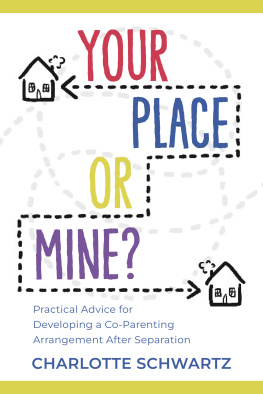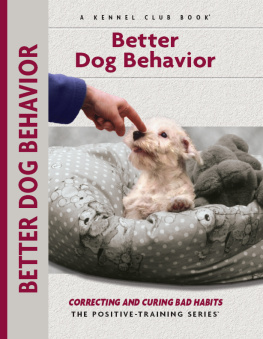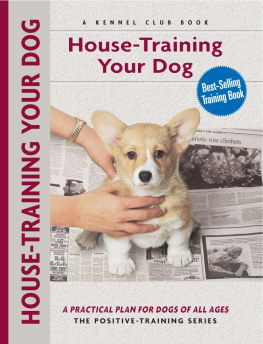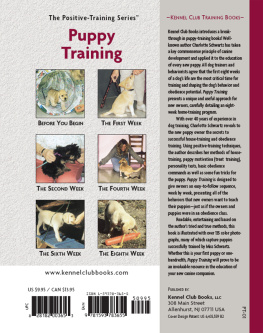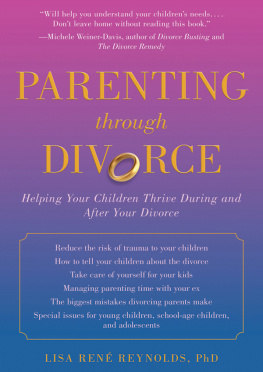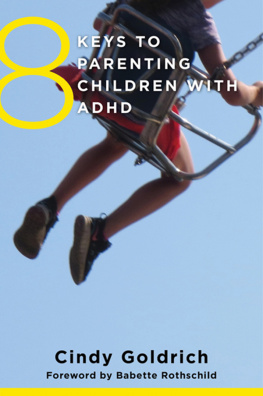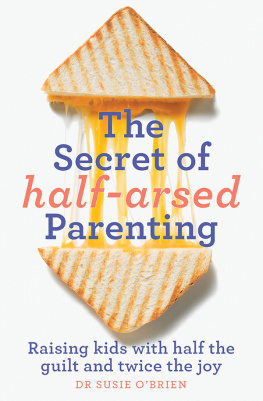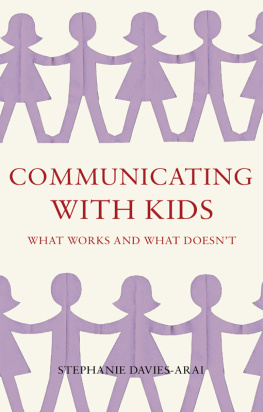Table of Contents
Landmarks
List of Pages
YOUR PLACE OR MINE?
Practical Advice for Developing a Co-Parenting Arrangement After Separation
CHARLOTTE SCHWARTZ

Copyright Charlotte Schwartz, 2022
All rights reserved. No part of this publication may be reproduced, stored in a retrieval system, or transmitted in any form or by any means, electronic, mechanical, photocopying, recording, or otherwise (except for brief passages for purpose of review) without the prior permission of Dundurn Press. Permission to photocopy should be requested from Access Copyright.
Publisher and acquiring editor: Kwame Scott Fraser | Editor: Robyn So
Cover designer: Laura Boyle
Library and Archives Canada Cataloguing in Publication
Title: Your place or mine? : practical advice for developing a co-parenting arrangement after separation / Charlotte Schwartz.
Names: Schwartz, Charlotte (Family law clerk), author.
Description: Includes index.
Identifiers: Canadiana (print) 20220233152 | Canadiana (ebook) 20220233209 | ISBN 9781459750050 (softcover) | ISBN 9781459750067 (PDF) | ISBN 9781459750074 (EPUB)
Subjects: LCSH: Joint custody of childrenCanada. | LCSH: Separated parentsCanada.
Classification: LCC KE600 .S33 2022 | LCC KF547 .S33 2022 kfmod | DDC 346.7101/73dc23

We acknowledge the support of the Canada Council for the Arts and the Ontario Arts Council for our publishing program. We also acknowledge the financial support of the Government of Ontario, through the Ontario Book Publishing Tax Credit and Ontario Creates, and the Government of Canada.
Care has been taken to trace the ownership of copyright material used in this book. The author and the publisher welcome any information enabling them to rectify any references or credits in subsequent editions.
The publisher is not responsible for websites or their content unless they are owned by the publisher.
Printed and bound in Canada.
Dundurn Press
1382 Queen Street East
Toronto, Ontario, Canada M4L 1C9
dundurn.com, @dundurnpress 


For the four of you kids, and the two of you dads.
We know today that our bodies keep a complete and faultless record of all the things we have ever experienced.
Back then I would fall for almost anything I thought that, like Lucy and Ricky Ricardo, my parents fights just meant they loved each other in a noisy way.
Wally Lamb, Shes Come Undone
Contents
Introduction
THE FIRST TIME I WROTE THIS INTRODUCTION WAS IN THE PANDEMIC newlywed stage. We all just needed to come together, do our parts, hunker down, and endure two weeks to flatten the curve. I was scared of the unknown but hopeful that it would be over soon, and that later we could laugh about how we had overreacted during that first visit to Costco and binge-watched end-times-themed movies on Netflix to pass the boring time at home.
Then, in just a couple of days, my world went from one that thrived on structure to one that failed to provide it at every turn. I had to start working exclusively from home (in the BC before coronavirus era, going to my office had been an escape); the kids schools were shuttered indefinitely; our child-care provider could no longer work, in the name of physical distancing; and I had to figure out how to work efficiently, care for our home, care for four kids, and care for myself, all at once. None of the things we ended up choosing during that time felt like choices, because none of them felt voluntary. Just the lesser of the evils available to us.
The pandemic could have also meant an about-face for my already co-operative relationship with Steve, the father of my two boys. We were both fortunate to remain employed in this unanticipated climate, and thats where the trouble could reasonably have begun. When it became apparent that we were about to be at home for a really long time, we were almost immediately thrust back into the familiar positions we had found ourselves in during our marriage when one of our kids was sick: Whose job is more important today? If someone loses their job because of this, whose job is the easier one to lose? If someone needs to work and care for the sick kid, who can do that with more ease?
Steve and I agreed right away that the boys residential schedule (where they spend their nights, after-school hours, and weekends) would not change. Then the courts in Ontario did the same thing, telling inquiring parents that they ought not to change the residential schedules set for their children simply because of the pandemic. The courts took it a step further and said such upheaval would have a greater negative impact on the children than would the worlds state of affairs. In their view, there was no good reason to dismantle the little structure that did remain for the kids by creating even more change, unnecessarily.
Of course, there were families that felt they had no choice but to change their schedules because one parent was a front-line medical professional, police officer, paramedic, or grocery store worker, and at that time there was no vaccine on the horizon, and we had very little information about the disease.
In our case, what had to change were the kids days. Without school, they had five hours and fifty-five minutes of unclaimed daytime during which they suddenly needed to be cared for. Despite priding ourselves on comprehensive, watertight agreements (by family law standards), what no separation agreement or parenting plan in the history of humankind has ever foreseen is an unexpected and indefinite period of school and daycare closures in response to a global pandemic.
Oh no, they have not.
And then the courts did something theyd never done before: they mostly closed their doors.
Whereas, in the before-times, you could run to court on almost no notice to attempt to address issues that you thought were urgent, the courts began to triage matters that came in under the label emergency, determining who could and couldnt speak to a judge based on the severity of their circumstances.
People (myself included) were shocked to learn what constituted an emergency under these new temporary rules, and those who did not meet the urgency test were very much left to their own devices. Without saying it out loud, the court was doing something refreshing: they were looking people in the eye and telling them, Resolve this, or wait. And the wait was indefinite. If you chose to wait, you were choosing many unknowns.
Without plans for the unplannable, countless families scrambled to make everything work, with very little guidance and with courts that intermittently closed their doors. Some, like Steve and me, can co-operate, but some absolutely cannot, for a myriad of reasons. For a lot of people, the closure of the court felt like calling 911 in an emergency and getting a busy signal.

